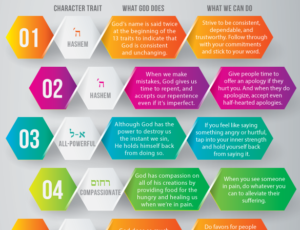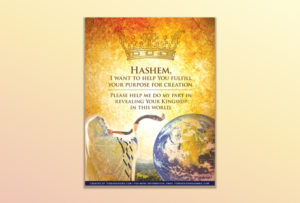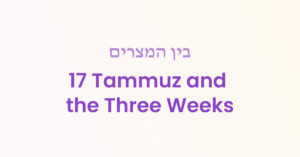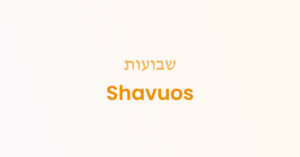A funny thing happens every year in Tishrei. We spend the whole month of Elul talking about teshuva, but when Rosh Hashanah finally comes, we don’t say Vidui at all!
Why not? Wouldn’t it be appropriate to apologize for our sins on this Day of Judgment? How are we supposed to merit a good judgement if we don’t apologize for our sins?
When we imagine Hashem administering judgement, we typically imagine Him like a judge sitting in court. The judge scrutinizes the accused individual, weighs the proofs against him and the evidence in his favor. Finally, the judge decides: innocent or guilty? If he is guilty, he is punished… and if he is innocent, he is let free.
But the Sifsei Chaim1 teaches that this is not the type of judgment Hashem does on Rosh Hashanah. Hashem is not deciding how much reward or punishment we will receive. Reward and punishment are saved for the Next World, and will only be determined on the Ultimate Day of Judgment, when Moshiach comes.
So if Hashem isn’t deciding about reward and punishment, what is He deciding?
A Yearly Accounting
The Sifsei Chaim2 teaches that on Rosh Hashana, Hashem judges us based on one factor: How much do we care about revealing His Kingship in this world?
On Rosh Hashana, Hashem judges us based on how much we care about revealing His Kingship in this world.
As we explained earlier, Hashem created this world with a specific goal in mind: That the entire world should recognize Hashem as our King. Whether we are aware of it or not, Hashem is always secretly guiding the world so that it will reach this ultimate purpose.
Just as a CEO makes an accounting each year to determine the success of his company, Hashem re-evaluates the world every year to see how close it is to reaching its ultimate purpose. Is the world slowly coming to recognize Hashem, or is everyone still shrouded in darkness and confusion? Is everyone aware that Hashem is the only true Power in the universe? Or do people still believe that they control their own strengths?
Not only does Hashem look at the world as a whole, but Hashem looks at every individual, too. Each person is like one of Hashem’s “employees.” Hashem looks around His “company” to see who are His most loyal “employees.” Which people have taken steps in the past year to demonstrate that they care about Hashem’s commandments?
- Rav Goldfisher built a new yeshiva this year so that more bachurim can learn Torah.
- Chaim pushed himself to wake up on time for davening because He knows how important it is to daven with a minyan.
- Sarah took upon herself to light Shabbos candles 5 minutes earlier, to usher in Shabbos more peacefully.
- Yehudis learned the Sefer Chofetz Chaim every day because she knows how much Hashem doesn’t like us to speak negatively about our fellow Jews.
- Shira worked on having extra kavannah in her brachos to remember that all food and parnassah comes only from Hashem.
Hashem looks at every individual Jew as one of His “employees.” Which employees are the most loyal employees – showing that they care about His mitzvos?
According to the level that an individual cares about revealing Hashem’s kingship in this world, to that degree he merits to be written in the Book of Life. Just as a CEO will re-hire only its most loyal employees into the new year, Hashem, too, wants only to re-hire His most loyal employees.
The more we show Hashem that we care about revealing His kingship in this world, the more we merit to be written in the Book of Life.
This explains why we say many times in the Rosh Hashanah davening, “Zachreinu L’chaim… V’kasveinu b’Sefer HaChayim L’ma’ancha Elokim Chayim – Please write us in the Book of Life for Your sake, Hashem!” We want to live for another year for YOUR sake! Not just so that we can live an easy life of fun and relaxation. We want to live another year so that we can serve YOU better!3
So we see here that our judgment on Rosh Hashana is based on the PAST, but for the purpose of the FUTURE. Hashem looks at our mitzvos and aveiros from the past year as indicators of whether or not we have been loyal employees. But Hashem’s purpose is not to decide who is innocent and who is guilty. Rather, Hashem is just trying to see which people He should “re-hire” for next year, and what tools and experiences each of us will need in order to fulfill our personal missions for the upcoming year.4
For example, Hashem might decide to give Rav Goldfisher more money so that he can better build up his yeshiva. Hashem might give Shira more delicious food so that she can continue saying brachos with kavannah. Hashem might give Yehudis a stronger memory so that she can remember all the halachos she learned in the Sefer Chofetz Chaim.
On Rosh Hashana, Hashem is judging us based on the past, but for the sake of the future.
When There’s a Will, There’s a Way!
Understanding this fundamental concept allows us to understand a mind-blowing secret or how to be inscribed in the Book of Life for the coming year: On Rosh Hashana, each of us has the power to re-define ourselves as a Tzaddik or a Rasha, simply by increasing our aspirations to reveal His kingship in the world. A person can totally transform his entire spiritual state on Rosh Hashanah just by strengthening his commitment to doing Hashem’s Will.5
On Rosh Hashana, each of us has the power to re-define ourselves as a Tzaddik or a Rasha, simply by increasing our aspirations to reveal His kingship in the world.
Because as much as Hashem looks at our past deeds, it’s really all about the future. Hashem just wants to know if we will act as His loyal, dedicated employees in the upcoming year.
Of course it would be best if we already proved ourselves by doing a lot of mitzvos last year. But just in case we didn’t live up to our potential, Hashem gives us another chance. We have this two-day opportunity of Rosh Hashanah to show Hashem that no matter what I did last year, looking forward, I wholeheartedly and sincerely want to do Your Will.
If Hashem sees that we truly aspire to reveal His kingship in this world, then we are considered Tzaddikim, and written in the Book of Life. But if someone chas veshalom doesn’t care about furthering Hashem’s mission for this world… then his judgment might not be so favorable.
We can now understand why we don’t say Vidui on Rosh Hashanah.6 On these two days, we can forget about the past and focus solely on the future. Instead of harping on our sins and feeling like horribly guilty people, we spend lots of time on Rosh Hashanah engrossed in tefillos centered around Malchus Shamayim – davening for Hashem’s kingship to be revealed in this world. By spending so much time engrossed in these tefillos, we show Hashem what we really care about. We sincerely yearn for the whole world to recognize Hashem as King!
When Hashem sees how much we care about fulfill the purpose of Creation, He sees that we are dedicated employees, and inscribes us in the Book of Life for the new year.
Shofar: The Moment of Judgment
When does Hashem decide all of this? Chazal7 teach us that the time of judgment is during shofar-blowing.
Hashem judges us during shofar-blowing.
So this year, as we hear the shofar on Rosh Hashana, let’s try to focus on the global purpose of creation. Let’s commit ourselves to helping Hashem reveal His kingship in this world. Let’s aspire to be part of this global mission. By strengthening our aspirations to reveal Hashem’s Kingship, may we all merit to be inscribed in the Book of Life!
Sources: [1] Sifsei Chaim Moadim Vol. I. pg. 94; [2] pg. 96; [3] pg. 102; [4] pg. 100; [5] pg 107; [6] pg. 96; [7] Sfas Emes, also Sifsei Chaim pg. 101 quoting Ye’aros Devash Vol. I. Drush 6
Want to download a printable poster, or a bookmark to keep in your siddur? Click here to download
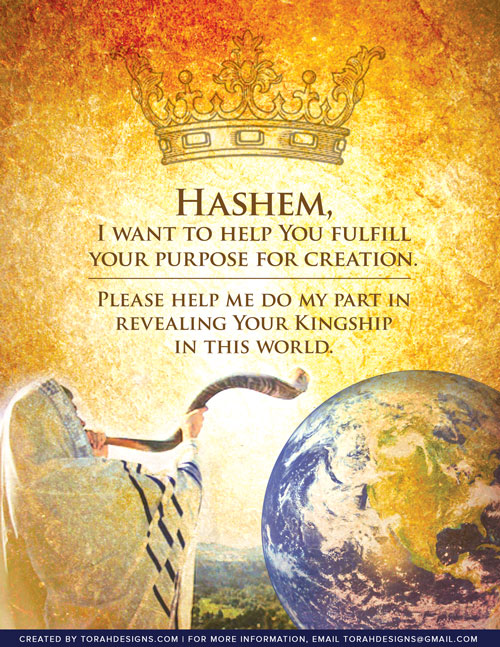
Your Challenge
Take a piece of paper and write answers to the following questions:
- What are 3 things you did this past year to reveal Hashem’s Kingship in this world? (Remember: Any time you do a mitzvah, you are revealing Hashem’s Kingship in this world because you’re showing that you care about fulfilling His Will.)
- What are 3 things you personally plan to do next year, to continue revealing Hashem’s Kingship in this world?
- What are 3 tools you’d like Hashem to give you for next year, to help you do more mitzvos? (For example: I need Hashem to give me strong muscles so that I can build my Sukkah. I need Hashem to give me restful sleep so that I can wake up refreshed and focus well on my davening in the morning.)
Remember: Just because Hashem gave you something last year (money, health, strength, etc.) there is no guarantee that He will give it to you again next year! We start every year with a new blank slate.
Questions for Discussion
- Find at least 3 places in the Rosh Hashanah davening where we ask for – or describe – Hashem’s Kingship being revealed in the world. What words do we say?
- Imagine someone says to you: “You’re talking about revealing Hashem’s kingship in the world but I actually don’t care about that at all. I want to just live a free life and do whatever I want!” What would you respond?
- Rosh Hashana has 3 other names: Yom HaDin, Yom Teru’ah, and Yom HaZikaron. Why do you think we most commonly refer to it as Rosh Hashanah? Wouldn’t it be more appropriate to call it Yom HaDin, since the main thing happening is our judgment?
- If Rosh Hashanah is all about Hashem’s Kingship, it’s easy to understand why Mussaf includes a section called Malchiyos. But what do Zichronos and Shofaros have to do with Hashem’s Kingship? How do they fit the theme?
- Why do we have Rosh Hashana before Yom Kippur? Wouldn’t it make more sense to apologize for our sins and earn forgiveness before our day of judgment?
- There are many people in the world who overtly transgress Hashem’s commands, but they are still alive! They don’t care at all about revealing Hashem Kingship in this world. Why does Hashem keep them alive?
- How does blowing the shofar represent the epitome of Kabbalas Ol Malchus Shamayim? Wouldn’t it be better for us to express something in words, like “Hashem, we accept You as our King”?
- In the Torah readings for Rosh Hashanah, we read about the miraculous birth of Yitzchak, the story of when Hashem saved Yishmael from dying, and Akeidas Yitzchak. How do each of these stories relate to the theme of Rosh Hashana? What message are we supposed to learn from each one?

